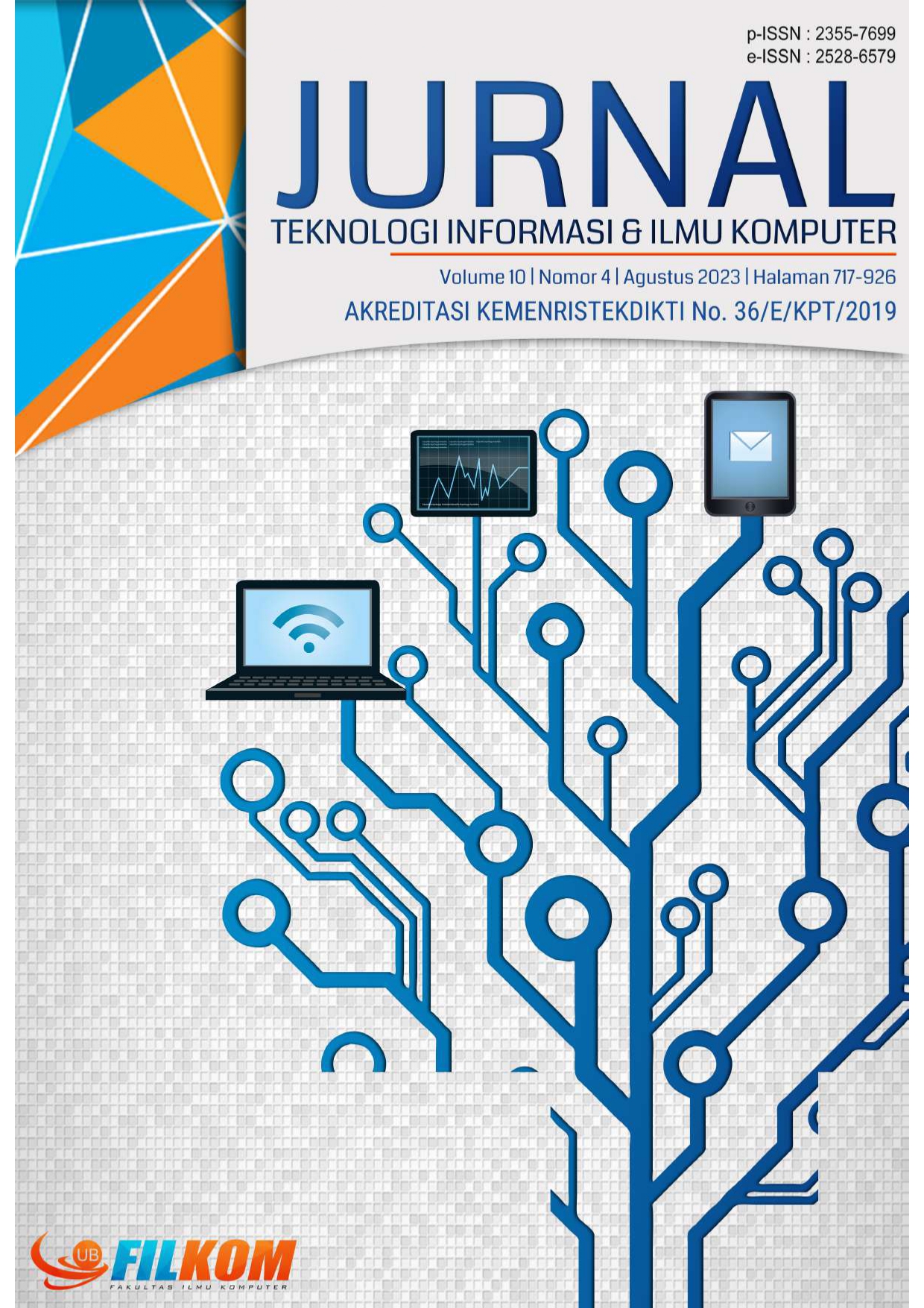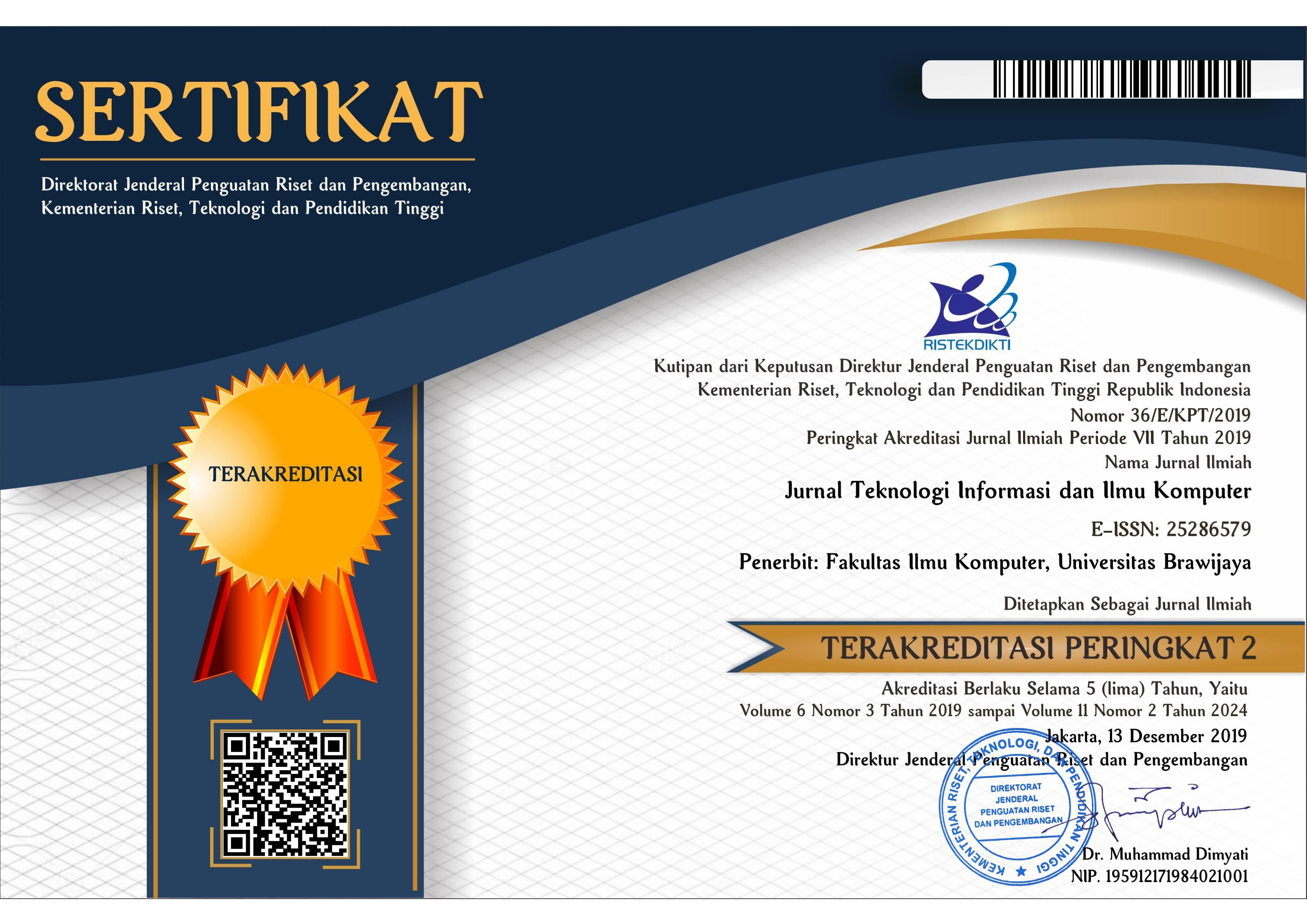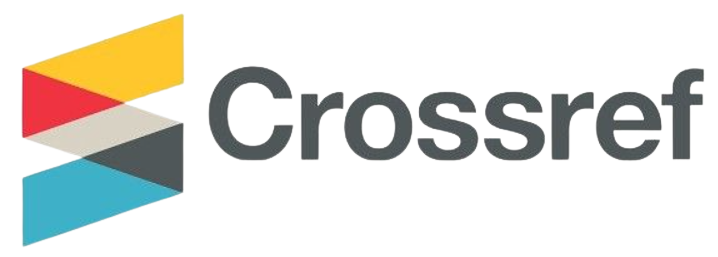Analisis Kualitatif Elemen Gamifikasi dalam Games Berbasis ICT untuk Anak Usia Dini
DOI:
https://doi.org/10.25126/jtiik.2024106285Abstrak
Pembelajaran berbasis gamifikasi menghadirkan pengalaman baru bagi peserta didik. Tren penggunaan pendekatan gamifikasi ini semakin diminati di semua level pendidikan, terutama untuk level pendidikan anak usia dini. Penelitian ini bertujuan untuk mengidentifikasi elemen gamifikasi yang paling relevan dalam lingkungan pendidikan anak usia dini (PAUD) melalui kegiatan Focus Group Discussion (FGD) bersama guru PAUD di Indonesia. Hasil analisis temuan menunjukkan bahwa guru PAUD memiliki persepsi dan preferensi positif terhadap pembelajaran PAUD berbasis gamifikasi. Selain itu, hasil penelitian juga mengkonfirmasi bahwa terdapat sembilan elemen gamifikasi yang cocok untuk diterapkan pada pembelajaran berbasis gamifikasi di lingkungan PAUD, yaitu poin dan penghargaan, papan peringkat, lencana, tantangan, levelisasi, penanda progres, avatar, mata uang, dan kejutan. Hasil penelitian ini dapat menjadi dasar untuk penelitian masa depan dalam kaitannya dengan pengembangan prototipe sistem pembelajaran PAUD berbasis gamifikasi dengan fokus pada interaksi, pemberian penghargaan, pemecahan masalah, dan pemberian tantangan.
Abstract
Game-based learning brings new experiences for students. The trend of using the gamification approach is increasingly in demand at all levels of education, especially for early childhood education. This study aims to identify the most relevant gamification elements in early childhood education through Focus Group Discussion activities with early childhood teachers in Indonesia. The results of the analysis of the findings indicate that teachers have positive perceptions and preferences toward game-based learning in early childhood education. In addition, the results also confirm that there are nine elements of gamification that are suitable to be applied to in the early childhood environment, namely points and rewards, leaderboards, badges, challenges, leveling, progress bar, avatars, currency, and surprises. The results of this study can be used as the basis for further research in relation to developing a prototype of a game-based learning system in early childhood education with a focus on interaction, rewarding, problem solving, and challenges.
Downloads
Referensi
ADITYA, B.R., ANDRISYAH, ISMIATUN, A.N., ATIKA, A.R., PERMADI, A., 2022. Digital disruption in early childhood education: A qualitative research from teachers’ perspective. Procedia Computer Science, 197, p. 521-528.
CHEONG, C., FILIPPOU, J., & CHEONG, F., 2014. Towards the Gamification of Learning: Investigating Student Perceptions of Game Elements. Journal of Information Systems Education, 25(3), p. 233-244.
JACOB, A., FAATZ, A., KNÜPPE, L., & TEUTEBERG, F., 2022. Understanding the effectiveness of gamification in an industrial work process: an experimental approach. Business Process Management Journal.
KOLAR, T., & ČATER, B., 2018. Managing group flow experiences in escape rooms. International Journal of Contemporary Hospitality Management, 30(7), p. 2637–2661.
MARLENA, S., JANSON, A., & SÖLLNER, M., 2020. Capturing the complexity of gamification elements: a holistic approach for analysing existing and deriving novel gamification designs. European Journal of Information Systems, 29(6), p. 641-668.
MOHAMAD, S.N.M., SALAM, S., & BAKAR, N., 2017. An analysis of gamification elements in online learning to enhance learning engagement in Zulikha, J. & N. H. Zakaria (Eds.), Proceedings of the 6th International Conference on Computing & Informatics (pp 452-460). Sintok: School of Computing.
RAHAYU, S.L., & FUJIATI., 2018. Penerapan Game Design Document dalam Perancangan Game Edukasi yang Interaktif untuk Menarik Minat Siswa dalam Belajar Bahasa Inggris. Jurnal Teknologi Informasi dan Ilmu Komputer, 5(3), p. 341-346.
RODRÍGUEZ, I., PUIG, A., TELLOLS, D., & SAMSÓ, K. 2020. Evaluating the effect of gamification on the deployment of digital cultural probes for children. International Journal of Human-Computer Studies, 137.
SALEME, P., DIETRICH, T., PANG, B., & PARKINSON, J., 2020. A gamified approach to promoting empathy in children. Journal of Social Marketing, 10(3), p. 321–337.
SCHILLER, N., 2008. A portal to student learning: what instruction librarians can learn from video game design. Reference Services Review, 36(4), p. 351–365.
TOASA, R., BURBANO, E., CONSTANTE, A., HIDALGO, L., & MORALES, F., 2019. A Custom and Dynamic Game using Gamification Techniques to Children from 4 to 5 years old. 14th Iberian Conference on Information Systems and Technologies (CISTI).
USADA, E., & MUQTADIROH, F., 2011. Rancangan Puzzle Game Delbeldes. INFOTEL, 3(1), p. 32-36.
ZAINUDDIN, Z., & KEUMALA, C.M., 2021. Gamification Concept Without Digital Platforms: A Strategy For Parents On Motivating Children Study At Home During Covid-19 Pandemic. Pedagogik Jurnal Pendidikan, 8(1).
ZDRAVKOVA, K., 2014. Learning computer ethics and social responsibility with tabletop role-playing games. Journal of Information, Communication and Ethics in Society, 12(1), p. 60–75.
Unduhan
Diterbitkan
Terbitan
Bagian
Lisensi

Artikel ini berlisensi Creative Common Attribution-ShareAlike 4.0 International (CC BY-SA 4.0)
Penulis yang menerbitkan di jurnal ini menyetujui ketentuan berikut:
- Penulis menyimpan hak cipta dan memberikan jurnal hak penerbitan pertama naskah secara simultan dengan lisensi di bawah Creative Common Attribution-ShareAlike 4.0 International (CC BY-SA 4.0) yang mengizinkan orang lain untuk berbagi pekerjaan dengan sebuah pernyataan kepenulisan pekerjaan dan penerbitan awal di jurnal ini.
- Penulis bisa memasukkan ke dalam penyusunan kontraktual tambahan terpisah untuk distribusi non ekslusif versi kaya terbitan jurnal (contoh: mempostingnya ke repositori institusional atau menerbitkannya dalam sebuah buku), dengan pengakuan penerbitan awalnya di jurnal ini.
- Penulis diizinkan dan didorong untuk mem-posting karya mereka online (contoh: di repositori institusional atau di website mereka) sebelum dan selama proses penyerahan, karena dapat mengarahkan ke pertukaran produktif, seperti halnya sitiran yang lebih awal dan lebih hebat dari karya yang diterbitkan. (Lihat Efek Akses Terbuka).















